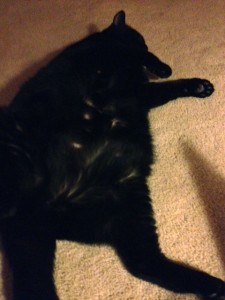 In my last post, I was telling you all about our conversation with Steve Dale about obesity in cats. In this post, we’re going to talk about why we and our humans need to pay attention to our weight.
In my last post, I was telling you all about our conversation with Steve Dale about obesity in cats. In this post, we’re going to talk about why we and our humans need to pay attention to our weight.
Our humans often think we look cute when we’re a bit roly poly, but they need to be careful about our weight for a couple of really good reasons: diabetes and arthritis. Overweight also causes some behavioral issues that can get us in trouble, and we’ll talk about those too.
First, Mr. Dale told us about a research study that required x-rays of 100 older cats. More than 90 of these senior kitties showed signs of arthritis! How many of the cat guardians knew their feline friend was in pain? HARDLY ANY OF THEM.
“Cats are subtle about showing their signs of not feeling well,” Mr. Dale said. So let these humans off the hook a little for not noticing. Becket is 10 and weighs 18 pounds, so the humans have to keep any eye on him!
Lots of people think that moving around less is a sign of old age, so they might not find it remarkable. “Old age isn’t a disease, osteoarthritis is!” Mr. Dale says.
If a kitty is 16, has arthritis and is overweight as well, there’s likely to be loss of mobility and pain (that the cat won’t let on about!). Winn Feline Foundation research says that overweight kitties are five times (that’s 500 percent!) more likely to deal with lameness. This is a good enough reason to strive for fitness, I think, but there’s more.
Diabetes.
One in every 400 cats will get diabetes, according to research from the Winn Feline Foundation, which affects the body’s ability to metabolize carbohydrates, proteins and fats (in other words, food). Diabetes usually turns up after age 6, and the most frequent patient is an older, overweight, neutered cat. Treatment for diabetes can be expensive and requires daily doses of insulin. Sometimes, however, when a kitty loses excess weight, the metabolism can right itself.
Top on the behavior issues in overweight kitties, as usual, is litter box use. As Mr. Dale pointed out, a really big kitty can easily miss the box when going to the potty. Issues surrounding the (mis)use of the litter box are one of the major reasons kitties are rehomed or abandoned, so this is really important.
If your humans have suddenly realized that you are overweight, tell them to take you to the vet to make a plan! The vet is the best resource to determine if we are overweight and to start a fitness plan.
Humans can help us take steps to avoid gaining weight in the first place. In tomorrow’s post, we’ll fill you in on Mr. Dale’s suggestions for changes in eating and exercising habits that can help us stay fit or support a weight loss plan. We’ll also see how Nutmeggy and Becket respond to some recent changes in their food and daily activities.
Pawsome post Chessie and Auntie Robin! Mom has had something she called an ‘a-ha moment’ after reading about obesity on kitties she never thought of before- concerning obesity and behavioral problems. Recently SOME kitty has been using a corner of Mom’s bedroom to pee pee in rather than using the box. IT CAN’T BE ME, so it MUST be my brofur Kaspars! Mom seems to be rudely hinting it might be me, the floofiest at 20 lbs. She says suddenly this not always using the litter box mystery is making sense…
Pffft! Can mew imagine the NERVE my Mom has to insinuate it is ME simply because I am a floofy lady cat?!
My brofur Kaspars is no slim Jim! He eats like a hog compared to me!
*sniffs, holds nose in are defiantly and whips tail about, insulted*